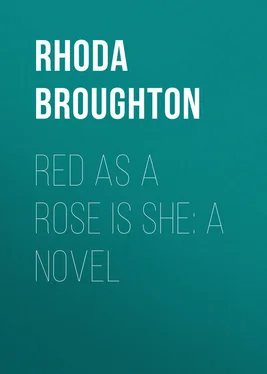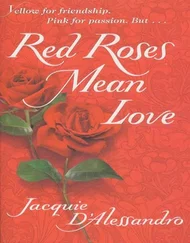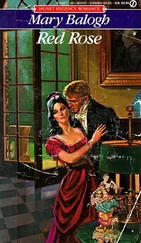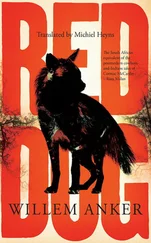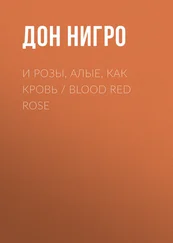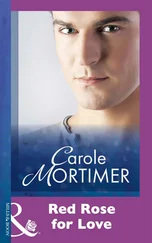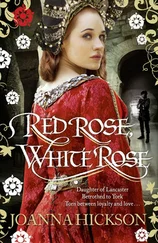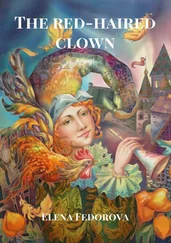Rhoda Broughton - Red as a Rose is She - A Novel
Здесь есть возможность читать онлайн «Rhoda Broughton - Red as a Rose is She - A Novel» — ознакомительный отрывок электронной книги совершенно бесплатно, а после прочтения отрывка купить полную версию. В некоторых случаях можно слушать аудио, скачать через торрент в формате fb2 и присутствует краткое содержание. Жанр: foreign_antique, foreign_prose, на английском языке. Описание произведения, (предисловие) а так же отзывы посетителей доступны на портале библиотеки ЛибКат.
- Название:Red as a Rose is She: A Novel
- Автор:
- Жанр:
- Год:неизвестен
- ISBN:нет данных
- Рейтинг книги:3 / 5. Голосов: 1
-
Избранное:Добавить в избранное
- Отзывы:
-
Ваша оценка:
- 60
- 1
- 2
- 3
- 4
- 5
Red as a Rose is She: A Novel: краткое содержание, описание и аннотация
Предлагаем к чтению аннотацию, описание, краткое содержание или предисловие (зависит от того, что написал сам автор книги «Red as a Rose is She: A Novel»). Если вы не нашли необходимую информацию о книге — напишите в комментариях, мы постараемся отыскать её.
Red as a Rose is She: A Novel — читать онлайн ознакомительный отрывок
Ниже представлен текст книги, разбитый по страницам. Система сохранения места последней прочитанной страницы, позволяет с удобством читать онлайн бесплатно книгу «Red as a Rose is She: A Novel», без необходимости каждый раз заново искать на чём Вы остановились. Поставьте закладку, и сможете в любой момент перейти на страницу, на которой закончили чтение.
Интервал:
Закладка:
"I had a worse infliction than any dust to bear," says Esther, stretching her long throat around the bigonia to get a fuller view of her vis-à-vis .
"A baby, of course?" replies he, stretching his neck too for a like purpose.
"An aggravated case of baby – a baby that had something odd the matter with it."
"Not so bad as a man drinking sherry," says he, his grey eyes and a bit of his nose laughing through the leaves; "a woman eating gingerbread is bad enough. I travelled once with a woman who ate gingerbread from London to Holyhead without stopping."
"And did not offer you any?"
"Good heavens, no! What a prodigious suggestion! – that would have been adding insult to injury."
"If I had been travelling with you I should undoubtedly have offered you some. I should have judged you by myself, and I am very fond of gingerbread."
"Indeed!"
"And" (with a mischievous look) "fonder still of peppermint lozenges, particularly in church on hot Sunday afternoons."
They were getting quite voluble, chatting and chirping like a nest of magpies – like children playing and laughing in a garden, unmindful that in a cave in a corner is a great old bear who may pounce out on them at any moment. The Felton bear pounces.
"What the devil do you mean leaving that door open? Morris! John! George! Here, some of you! there's a door open somewhere between here and the kitchen. Don't contradict me, sir! I say there is; if I catch you propping those swing doors open," &c. &c.
The birds have gone to bed, and the slugs come out to walk on the damp garden paths. Now and then a little wind gets up, whispers a word or two to the polished laurel leaves, and lies down again. There is a carpet of thin, smoke-grey clouds over heaven's blue floor. The two girls are strolling up and down the terrace walk. Esther has got a red cloak thrown about her shoulders; she is not in the least afraid of taking cold, and declined the offer of it in the first instance; but on second thoughts, reflecting that the dining-room windows look on the terrace, and that the fairy prince may see and like the combination of black eyes and red cloth (fairy princes being always partial to gay colours), accepted it.
I have called Esther "little," and Miss Blessington "large" but the truth is they are much of a height. The difference between them is, that one is a young, slight sapling that has been so busy shooting up skywards, that it has had no leisure to grow broad, and that the other is a full-grown, spreading, stately forest tree. And yet they are the same age; but some women develop, mind and body, much quicker than others.
From the unshuttered dining-room windows comes a great square of yellow lamplight, and lies smooth upon the gravel. Looking in you see rifled fruit dishes, half-filled wine-glasses, moths flying round and round the lamp globes, trying their best to find an entrance to fiery death.
Sir Thomas, in his red velvet easy chair, with his white duck legs stretched out before him – duck trousers and a blue coat and brass buttons are, I need hardly say, the fine old English gentleman's dinner costume – with his head thrown back, till you can see either up into his brains or down his throat, whichever you choose. St. John, with his elbow resting on the shining oak table, which reflects it as a mirror would, and his head on his hand, in a brown study.
"Do you always walk up and down here, Miss Blessington?" inquires Esther, who is getting rather tired of pacing along, along, along monotonously, with her gown sweeping a little avalanche of pebbles behind her.
"Generally" (with a pretty smile).
Miss Blessington has a very pretty smile – an "angelic smile" – people say who see her only once; but it is only one, and is aired every hour of the day – comes out for Sir Thomas, for Lady Gerard, for servants, for dogs, for callers, for old almswomen, for St. John – so that none can take it personally, can they?
"By yourself?"
"Not generally."
The pretty smile is dashed with a faint complacency.
("H'm! That means with St. John —
"'Walking in a shady grove
With my Juliana.'
"Pleasant look-out for me! A bad third! What a pity that Bob is not here! we should be a partie carrée , and might change partners every now and then; Miss Blessington should have Bob, and I would have St. John!")
Below the terrace spreads a large square of grass, uninvaded by flower-bed or shrub, mowed and rolled, rolled and mowed, into the similitude of a pancake for flatness. There croquet-hoops glance whitely in the soft half-light; mallets lie strewn like dead soldiers after a battle; balls red, blue, and yellow, like great ripe fruit tumbled among the grass.
"Is this your croquet-ground?"
"Yes."
"Nice and level?"
"Yes."
"Like a billiard table, only a prettier green?"
"Yes; would you like a game?"
"Better than doing nothing, isn't it?" answers Esther, cheerily; she being a young woman to whom the words rest and enjoyment are not synonymous, as they mostly grow to be to people in later years.
From the dining-room comes the faint melody of the trombone, played with the skill of much practice by Sir Thomas's nose. Some one comes to the window, looks out, puts a hand on the sill, and jumps down. St. John apparently has an aversion from going out and coming in by the authorised modes of exit and entrance. Now that one can see him without any bigonia interposing, one notices that he has kind, eager eyes – eyes that seem to be looking, looking for something that they have not found yet – and rather a long nose, that the sun has got hold of and browned, as a cook browns mashed potatoes.
"Won't you join us, St. John?" asks Miss Blessington, stooping to reinstate a fallen hoop, and looking calm invitation at him out of her great, fine, passionless, cow eyes.
St. John hesitates, and looks towards Esther to see whether she is not going to second the invitation; but she is balancing herself with her two feet on a croquet-mallet, and does not appear to see him.
"Gooseberry I may be," she thinks, "but, at all events, I won't be instrumental in making myself so."
"Do I ever play?" asks he, with petulance, walking off in a huff.
"He did not accept your invitation with the exultant gratitude one would have expected, did he?" says Miss Craven, maliciously.
"He hates the game," replies Miss Blessington, rather sharplier than is her wont – "particularly playing with odd numbers."
"Oh!"
The match begins; it is about as fair as a foot race between Deerfoot and a lame baby. Esther has played about six times in the course of her life; Miss Blessington about six thousand. Miss Blessington makes the round of the hoops in triumphant solitude, while poor Essie struggles feebly, ignorantly, unscientifically, to ring a bell that refuses to emit the faintest tinkle.
"Hare and tortoise!" cries she, laughing at her own discomfiture; "you'll go to sleep presently, and I shall crawl in and win."
"Since you wish me, I don't mind taking a mallet," says St. John, appearing suddenly round a big Wellingtonia, and looking confusedly conscious of being seen descending very awkwardly from his high horse.
"How do you know we wish you to take one? – we never said so," says Essie, flashing at him with her wicked, laughing, half-lowered eyes. ("Since I am another's and he is another's, I don't see why we should not try to amuse each other," she says to herself.)
"It is your turn to play, Miss Craven," interposes Constance, coldly.
"Come to my rescue, won't you?" says Esther, making her seventy-second careless, abortive attempt at the bell, and throwing twice as much empressement into her voice from the amiable motive that she thinks such empressement is displeasing to Miss Blessington.
Читать дальшеИнтервал:
Закладка:
Похожие книги на «Red as a Rose is She: A Novel»
Представляем Вашему вниманию похожие книги на «Red as a Rose is She: A Novel» списком для выбора. Мы отобрали схожую по названию и смыслу литературу в надежде предоставить читателям больше вариантов отыскать новые, интересные, ещё непрочитанные произведения.
Обсуждение, отзывы о книге «Red as a Rose is She: A Novel» и просто собственные мнения читателей. Оставьте ваши комментарии, напишите, что Вы думаете о произведении, его смысле или главных героях. Укажите что конкретно понравилось, а что нет, и почему Вы так считаете.
